Samantha Varela was just a 16-year-old high school student taking courses at FGCU through the Accelerated Collegiate Experience when a chance invitation from a classmate led her to discover the Food Forest, along with a new passion and purpose.
“She and I walked in and I immediately felt a sense of place, a sense of belonging, that I had never felt before,” Varela recalled. “I had never heard of a food forest or had any connection to agricultural systems.”
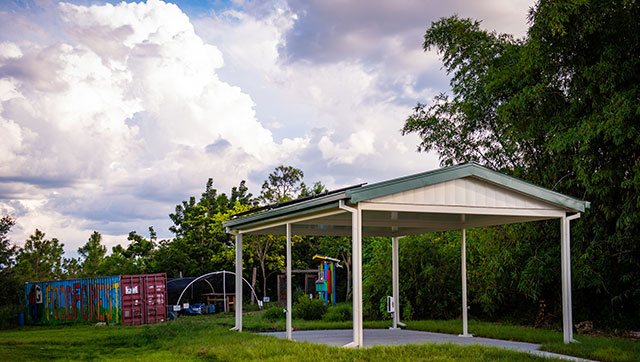
By the time she graduated from Palmetto Ridge High School in Naples, Varela had been volunteering at the Food Forest for two years. Something sprang to life in her during all those hours spent tending the soil, nurturing plants and tasting the fruits of her labors. She couldn’t uproot herself to go to college anywhere else she had been considering.
“I decided to stay at FGCU because of the Food Forest,” she said. “It opened my eyes to a passion I had. I really threw myself into the deep end of the community around it.”
Varela graduated last December with an environmental studies degree and is now pursuing a master’s in the field at the University of Pennsylvania. Her ultimate goal is working as a consultant in regenerative agriculture, which involves revitalizing soil health.
Varela joined a long line of Eagles whose college experience and life paths have been influenced by the Food Forest ever since green-minded students, along with faculty and staff supporters, planted the first seedlings in 2011. The half-acre site between the Sugden Welcome Center and Kleist Health Education Center had previously been a parking lot.
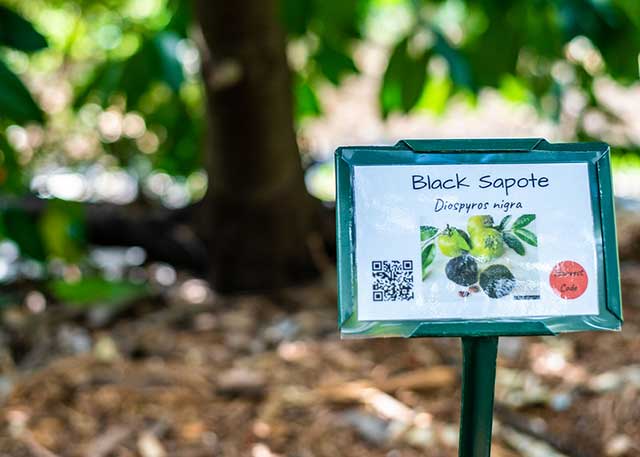
Firmly rooted in FGCU’s sustainability and interdisciplinary values, the Food Forest has yielded a bumper crop of dividends: nourishing food, contemplative time and service-learning opportunities; hands-on learning about native plants, soil science and sustainable agriculture as well as a leadership, communication and civic engagement skills; and alumni entrepreneurs who are transplanting their Food Forest experience into the business world and creating jobs.
“It was a great experience to see how the campus came together,” said Erica Klopf (’12, Environmental Studies and Art), who designed the original layout of the permaculture garden as a senior research project. More recently, she has been working full time designing a 60-acre botanical garden in the Florida Keys. “The Food Forest was completely student driven — that’s what’s so special about it to this day. The students know all the plants, how to work irrigation, how to solve problems. They have to stay on top of every little issue that comes up.”
Hurricane hits
It was no little issue when Hurricane Irma thrashed the Food Forest in September 2017, tearing down fencing, knocking over trees or breaking limbs, and crushing the understory.
“The damage was pretty heartbreaking,” recalled Varela, who evacuated to Orlando before Irma hit Southwest Florida with a peak wind gusts of 142 mph in Naples. “The first place I came when I got back was the Food Forest — I didn’t even go home first. There was a lot of debris. You couldn’t even get in the entrance there were so many trees toppled. It has easily taken two years to recover, and I’m not sure we’re at full recovery yet.”
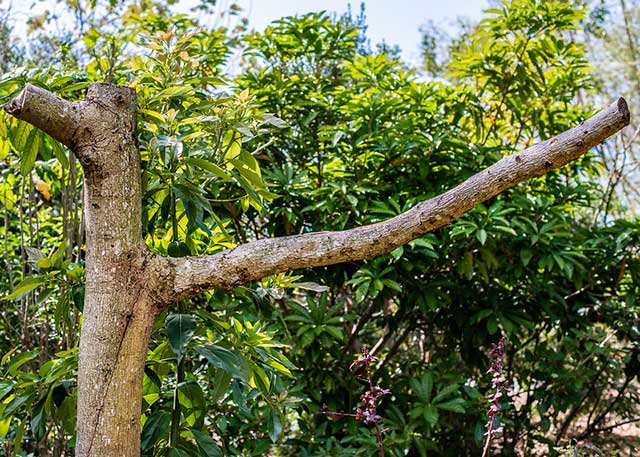
Some trees could be propped up and nursed back to health, while others were too severely damaged to be saved. A towering jackfruit favored by roosting screech owls was lost. The plant nursery was blown over. Signs identifying the 47 plant species had to be replaced. Paths had to be cleared through the labyrinth of trees and shrubs.
Food Forest student coordinators marshaled volunteers for the recovery effort. As Klopf said, management of the property is completely student driven. Coordinators authorize service-learning as well as oversee tours by local schools, garden clubs and other groups. The Food Foresters club, meanwhile, organizes fun educational activities for students and pairs with the Food Forest Governing Board to raise funds for improvements such as the new open-air pavilion constructed in August; the long-planned shelter offers a staging area with shade and drinkable water that will enable better demonstrations and other activities once pandemic-related precautions can be lifted.
“We’ve never had that,” said Jessi Drummond (’14, Environmental Studies),” who volunteered as a student and now serves as Food Forest advisor. “We’re very excited about the educational opportunities the pavilion provides — when they can be held again.”
Signs of recovery
Before graduating in May with an environmental studies degree, then-Food Foresters President Julie Motkowicz led a visitor through the grounds, pointing out signs of Irma’s aftermath: partial sections of new fencing; a loquat tree leaning at an unnatural angle; tree limbs that were splintered by winds or flying debris that have sprouted new growth. Even hurricane clouds have a silver lining: They create an opportunity to rethink, revitalize and replant.
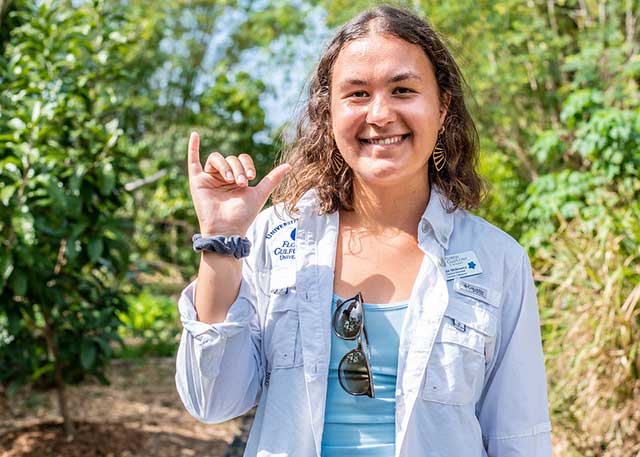
Motkowicz stopped to pluck an allspice leaf for her guest to sniff and to taste its cinnamon-like heat. In another nook along the sun-dappled path, banana trees bore deep-red flowers or hands of green fruit inching towards maturity. Unripe green papayas dangled in clusters from 10-foot trunks. The scent of Meyer lemon blossoms sweetened the air, while catbirds and woodpeckers called. A zebra longwing butterfly fell for the scarlet lure of a firebush.
“Whenever I come here, there are always people here studying, journaling, taking pictures,” said Motkowicz, who wandered in as a freshman and joined a tour. “It was mind blowing to me that this was on campus. Once I got involved I fell in love with the Food Forest and dove deep into Florida ecology. I became part of a community — we’re all friends, have potlucks, go camping.”
A self-identified introvert, Motkowicz discovered in the forest not only a common ground with like-minded souls, but also her own ability to develop marketable skills in communication, teaching and leadership through her work there. After graduation, she had planned to work at a permaculture garden in Maui, Hawaii, but the COVID-19 pandemic put a stop to that. Instead, she’s looking for environmental education positions in Southwest Florida and within the National Park Service.
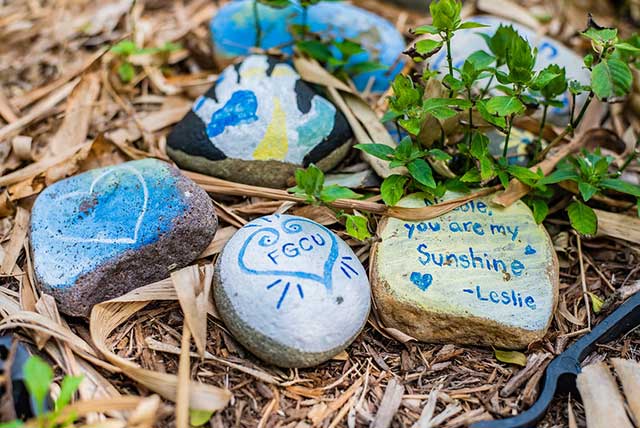
Like a lot of her peers, Motkowicz came to the lush greenscape not knowing much about where her food came from, about sustainable agriculture or fair-trade practices. As a Food Forester and campus naturalist, she enjoyed sharing her knowledge with others. Cultivating understanding is critical to keeping the garden flourishing as well as serving as a model for off-campus community groups that visit for information and inspiration about sustainable gardening and edible tropical/subtropical plants. Food Foresters have redoubled efforts to help students learn how not to waste fruit and vegetables by picking them before they’re ripe.
Other hurdles for the garden have included student turnover and funding. Efforts lately have been made to fortify oversight under the Department of Integrated Studies and the governing board. Annual reports are now being compiled to support institutional accountability. More educational programs are in the works.
Finding career paths
Meanwhile, every generation of Food Forest friends reaps what it sows. Alumni like Arlo Simonds (’19, Integrated Studies) and Cecelia Morales (’17, Elementary Education) are among former foresters featured on FGCU360.com previously for putting the principles they learned as students to work in the real world: he as garden operations manager and permaculture designer at the Pine Manor Community Center in Fort Myers, she as organic garden manager at Shangri-La Springs in Bonita Springs.
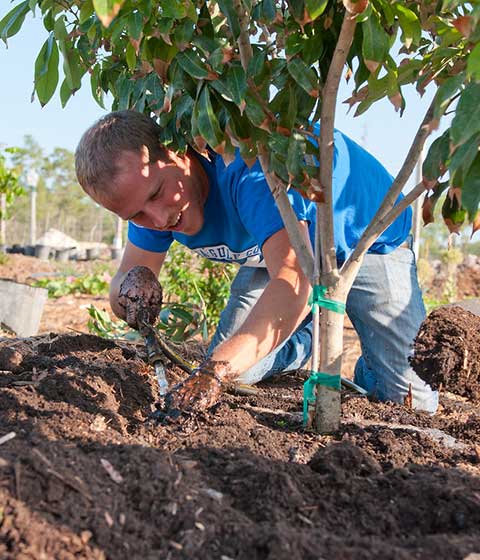
Drummond said it was part of what drew her back to FGCU to work in the Office of Service-Learning & Civic Engagement while pursuing a master’s degree in environmental science. “It’s what keeps me here — I love that place,” she says. “For me, it’s not only a place to go and harvest and eat but also a great way to work out and be with people. It’s a great place of solace and friendship and growth.”
One of the lead organizers and planters of the Food Forest, Scott Stimpson (’11, Environmental Studies), now lives in Oregon, where he launched his own wild food-foraging business called Woodland Cravings, after stints as a farmhand and park ranger. Whenever he returns to Southwest Florida, he’s likely to visit his favorite spot on campus.
“From the administrative work to the sweat, blood and tears that went into the land, every moment developed my leadership skills, public speaking and ability to not only see the prize at the end but understand all the smaller pieces and inner workings it takes to accomplish a goal,” he said. “Because of the Food Forest I’ve been exposing myself to understanding food and conservation even further. Now when I pay my visits to the first large initiative of my life, I’m overrun with constant joy. Not only because the Food Forest is growing, but because the current students who lead it are thriving. Seeing the love involved when becoming dedicated to its mission makes me know I did something right. There’s a level of intimacy that comes with caring for a project of its capacity, and I am eternally thankful for the opportunity I had to help develop it.”